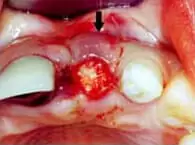
If a tooth becomes infected and painful, a root canal is a common treatment. Root canals do not fail often, but when they do fail, it is important to get the right treatment. Root canals involve the use of specialized tools to remove the root of a tooth and clean it so it is free of bacteria. Bacteria left inside the tooth will continue to grow and infect the tooth. If bacteria does continue to cause issues, extracting the tooth might be the only option to stop the pain. However, extraction leads to another problem, a missing tooth.
What Causes a Root Canal to Fail?
Root canals will fail if there are undetected canal branches, cracks in the root, or an obstruction that makes it difficult to properly clean the root of a tooth. A failed root canal will begin to hurt and could cause pain through a noticeable abscess tooth. Regular dental cleanings and examinations can uncover a failed root canal. X-rays taken at the time of an appointment also can allow Dr. Silberg to examine the root of the tooth to see if there are concerns that need to be addressed, and if the root canal has failed.
What Can I Do If a Root Canal Fails?
If you are feeling any of the symptoms mentioned above, please contact Dr. Silberg if you suspect your root canal has failed. Root canals normally fail if the tooth has been treated several times. Caps or crowns on the tooth often need to be replaced every 7-10 years. Dental implants are one of the best options to replace a missing tooth. We of course will consider every possible option for our patients to help you save money and ensure you receive the right treatment for your condition. Call our office to schedule a consultation to discuss your failed root canal options.
Choosing Dental Implants
Dental implants are preferable as they are a long-term solution for a missing tooth. Dental implants will help the jaw bone to stay strong as the implant bonds to the bone, encouraging the body to continue nourishing the jaw bone instead of letting it deteriorate. Dental implants have a 97 percent success rate and are one of the best treatments for patients in need of a tooth replacement. If the tooth needs to be extracted and you believe that a dental implant is the best option to restore your smile, contact Dr. Silberg to schedule a consultation. He and our staff will work with you to build a beautiful smile that includes a dental implant and crown that will match the color and look of your existing teeth.









